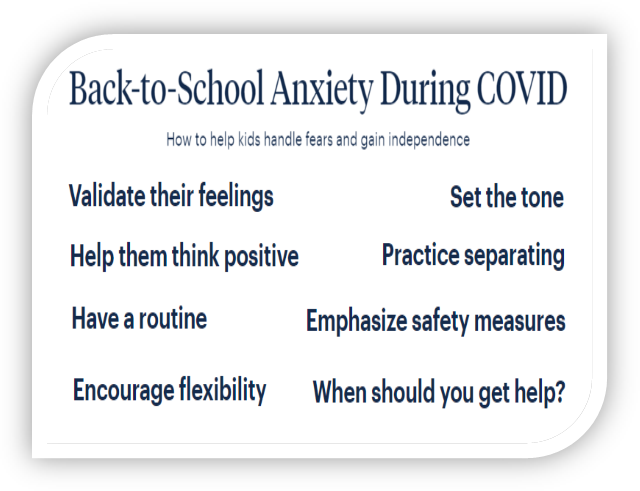Attendance Report

Dear Parents and Carers,
Going to school is usually an exciting and enjoyable event for children and adolescents. However, most children are occasionally reluctant to go to school or have some anxiety about activities like school camp; it is also normal that at some stage in life most of us will feel anxious when faced with a difficult situation. Anxiety becomes a problem when it is persistent and prevents a person from enjoying normal life experiences for a long period of time. You can help your child to cope with anxiety in effective ways and, in doing so, help them develop self-confidence and resilience.
Signs of anxiety include:
· Having lots of worries and a strong need for reassurance
· Psychosomatic symptoms which occur before school (e.g. nausea, stomach aches, headaches or shortness of breath). These symptoms will reduce when the threat (fear of going to school) is removed
· Crying, being clingy or fidgeting when nervous
· Sleep problems such as difficulty falling asleep, nightmares or trouble sleeping alone
· Fear and avoidance of a range of different issues and situations.
It is important not to dismiss your child’s anxiety but to help them see that the situations they are worried about may not be as bad as they think.
· Remain calm: you will be better placed to make them feel more confident. Try not to let your child see that you are worried or frustrated.
· Listen to your child: encourage him/her to share their feelings and fears.
· Talk it through: discuss various scenarios, possible outcomes and ways to handle situations to help your child develop problem solving strategies.
· Let them have a go: avoid taking over or giving your child the impression, you will fight their battles for them. Some children with anxiety are happy for others to do things for them and if you take over, it might stop them learning how to cope for themselves. It also reinforces a perception that they are helpless and that someone will rescue them.
· Remind your child: everyone makes mistakes and that this is where the best learning comes from.
· Be punctual: Avoid being late when picking up or dropping off your child up from school.
· Problem solve: with your child about what is causing the anxiety. For instance, if your child has problems walking through the front gate, arrange for them to meet a friend or use another entrance. If they find socialising in the yard before school starts a source of anxiety, arrange for them to arrive just before the bell.
· Encourage & reassure: even if they will be late encouraging your child to go to school; reassure them that you will contact the school to explain.
· See the GP: arrange for a visit to the GP if your child reports persistent physical complaints.
· Be consistent: have a clear agreement between parents (even if separated) that school attendance is not optional and communicate this in a clear and calm manner to your child.
· Reward: provide rewards for appropriate behaviour and avoid unintentionally rewarding school avoidance.
· Be clear: be clear with instructions and requests and consistent with consequences.
· Be involved: if possible, be active in your child’s school through things like the school council or the canteen.
· Support: model skills for becoming more independent and how to manage appointments, multiple homework tasks and competing demands.
· Seek assistance: there is assistance and support available. The sooner you talk to your child’s school about concerns, the better.
· Get support: for yourself if things are feeling overwhelming and distressing
Here at MWPS we are always here to provide support to families who may be having a child who is experiencing some worries having anxiety about returning to school. Please reach out and let us know – our staff are always here to help!
Kind Regards,
Aira Agarano
Engagement and Attendance Officer


